Runners from a Coast high school break barriers in cross country, a mostly white sport
On the bus ride to the meet that would decide whether Pascagoula High School’s cross country team would advance to state, captain Leandra Ruiz broke out a speaker and her own music playlist.
Typically, the runners listen to their own music with their headphones. But ahead of the regional meet, the stakes were high for everyone. And for Ruiz, who sat out much of last season with an injury, this race offered the chance to prove she could compete with some of the fastest runners in Mississippi.
So the songs she chose for the bus ride, she explained, were “very hype.”
Sitting at the back of the bus with her speaker and her teammates, Ruiz cued a genre called dembow dominicano, with what Leandra called “crazy beats,” especially tracks by the Dominican rapper El Alfa, and songs that everyone knows, like Daddy Yankee’s Gasolina from 2004.
Of the eight top girls’ runners at Pascagoula, six, including Ruiz, are Hispanic. Some are currently enrolled in the English Learners program or, like Ruiz, participated when they were younger. Of the eight boys, two are Spanish speakers. During the regular season, when the group at practice is much larger, about half the runners are Hispanic.
In part, that reflects the demographics of Pascagoula, where most of the 13% of Pascagoula-Gautier students who are English Learners speak Spanish as their first language, and about 21% of Pascagoula High School students are Hispanic.
But the it’s also the result of efforts by teachers and coaches like Paula Montoya to ensure EL students participate in all aspects of school.
As an EL teacher at Pascagoula High, Montoya noticed that her students weren’t joining sports teams and extracurricular activities. So she started recruiting them to run cross country.
“Our kids didn’t do anything,” she said. “I’m like, I know some of you can run.”
Montoya said the team has the largest number of Hispanic runners of any in the area, quite possibly in the state.
“When we show up to competitions, we stand out quite well, cause we’re predominantly Hispanic,” she said. “They’ll start speaking Spanish. Everybody just turns around and looks. Or we’re cheering ‘em on, cheering in Spanish. Parents are looking at us.”
From casual joggers to neighborhood 5k heroes to professional marathoners, distance running in the United States is an overwhelmingly white sport.
Pascagoula is not a running community, as Montoya puts it. But with the cross country team, where many of the runners are still in their first year or two of running, she and her co-coach, Colmer Middle School teacher Jack Reddecliff, are trying to build an institution.
For most of fall 2021, however, Ruiz and her teammates focused on a goal that would be won or lost on a cool fall afternoon in George County: qualifying to run at state.
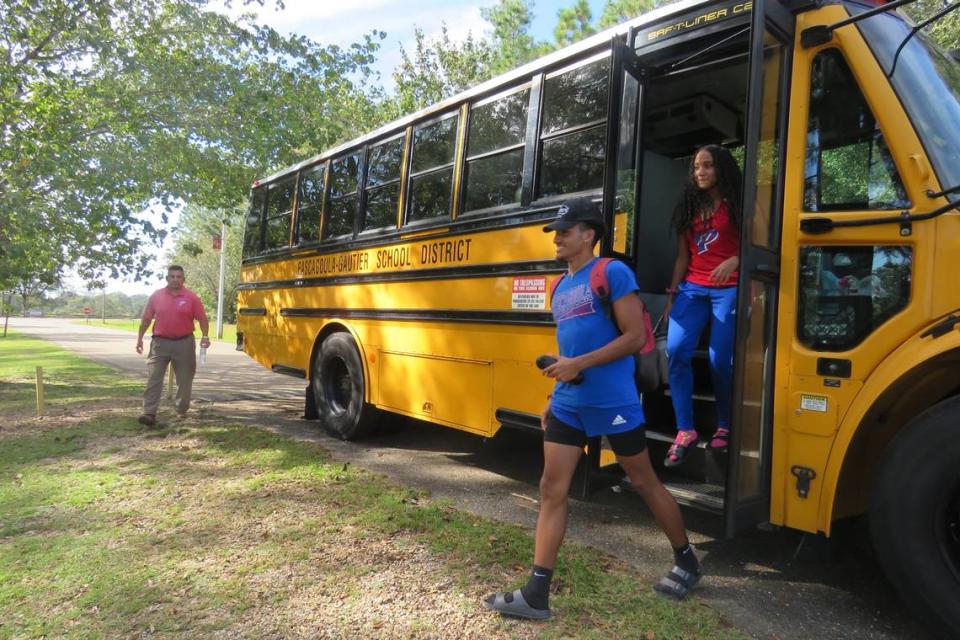
‘Running is not exactly fun’
Cross country is a simple sport. At every competition, every athlete does the same thing: Run 3.1 miles as fast as possible.
Other sports have drills and scrimmages and specific skills to learn. The only real way to get better at running is to run.
And that creates the cross country coach’s eternal challenge — convincing teenagers to do something uncomfortable day after day, for months and years, in the hopes of achieving difficult goals that, if met, will bring almost none of the adulation American communities tend to bestow upon, say, successful football players.
Most of the top runners on the Pascagoula team have practiced every day since June, usually in the suffocating humidity that characterizes summer in South Mississippi.
“Running is not exactly fun,” Montoya, who grew up running in Oregon and ran competitively in college, said while watching the team warm up a few days before regionals.
“It’s not very enticing,” Reddecliff added.
“Their reward is their outcome,” Montoya said.

For runners like Naomi Rodriguez, a senior, participation is also a reward. She moved to Pascagoula from Puerto Rico last year when she was a junior. She didn’t speak English, so school was a struggle. The first person she became friends with was a cross country runner who encouraged her to join the team. The idea was daunting.
“It was because of English,” she said. “I didn’t know anything, anything. I was scared about it. If I went to a race, I was gonna be so lost.”
She told herself she would join for her senior year. Last summer, she started running with the team for the first time, and wound up strong enough to run with the team at regionals.
Being able to speak Spanish with many of her teammates made her more comfortable. And at practices and meets, she also got the chance to help her non-Hispanic teammates.
“When we are talking Spanish, they try to talk Spanish, and that is so fun, I like that,” she said. “That means like they are learning something new.”
‘It’s not for the mentally weak’
By 2:20 p.m on the day of the regional meet, the team and their coaches had loaded up the school bus in the high school parking lot with their cooler, folding benches and tarps. The runners carried their backpacks and racing spikes as they filed into their seats: girls on the left, boys on the right.
“Hola, niños!” Leandra shouted.
As a kid in Puerto Rico, Leandra was always running. At 7, she joined a local track club and started going to competitions. She felt like she had found her “thing.”
In 2016, her family moved to Pascagoula. She had studied English in school, but only knew the basics. The straight-A student was frustrated to find herself making bad grades at first.

There were no youth track clubs like those in Puerto Rico. Her coach from back home would send her workouts, and her mom would follow her on a bike as she ran around Pascagoula.
In seventh grade, she joined the cross country and track teams at the high school. Now she’s hoping to get a college scholarship in track and work in sports medicine.
“Not many people know how much of a mental game and sport cross country is, and that it takes a lot of heart,” she said. “It’s not for the mentally weak.”
Representing the 787, the 829 and Platano Power
The bus turned off Highway 63 and pulled up next to George County High School. In the grass near the starting line, teams from across the Coast were setting up their tents and chairs.
The Pascagoula runners dropped their backpacks on their tarp, put on their spikes and rubbed Biofreeze ointment all over their legs.
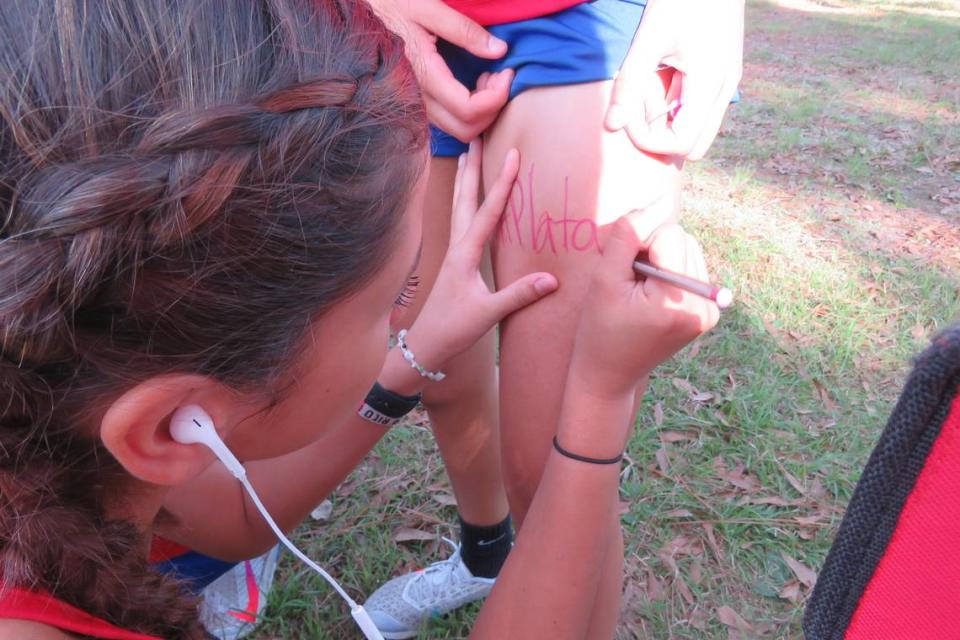
Using a pink sharpie, Leandra scrawled three numbers on her left leg, just above her knee: 787, the area code for Puerto Rico. Her teammate Carolina wrote 829 for the Dominican Republic.
Carolina and Leandra also wrote “Platano Power” on their legs, referencing the starchy fruit that is a staple of Caribbean cooking.
Kenairis Villanueva wrote 228 and “Tortilla Power,” because her teammates joke that she’s more white than she is Hispanic, and because her father is Mexican, so she speaks Spanish with a different accent and vocabulary than her teammates from Puerto Rico and the Dominican Republic.
On her leg, she scrawled what is widely considered the worst slur used against Mexican-Americans.
“They call Mexicans beaner,” she explained. By writing it on herself, she was reclaiming it with pride.
The sophomore had become the team’s fastest runner after Leandra. The pair knew each other’s strengths and weaknesses and pushed each other during races.
But for the last three weeks, an injury to her shin and IT band left her on crutches and kept her home from practice. Leandra had been running alone.
Kenairis had found out only the day before that she was cleared to run at regions. She wasn’t sure what to expect from herself, but she felt ready.
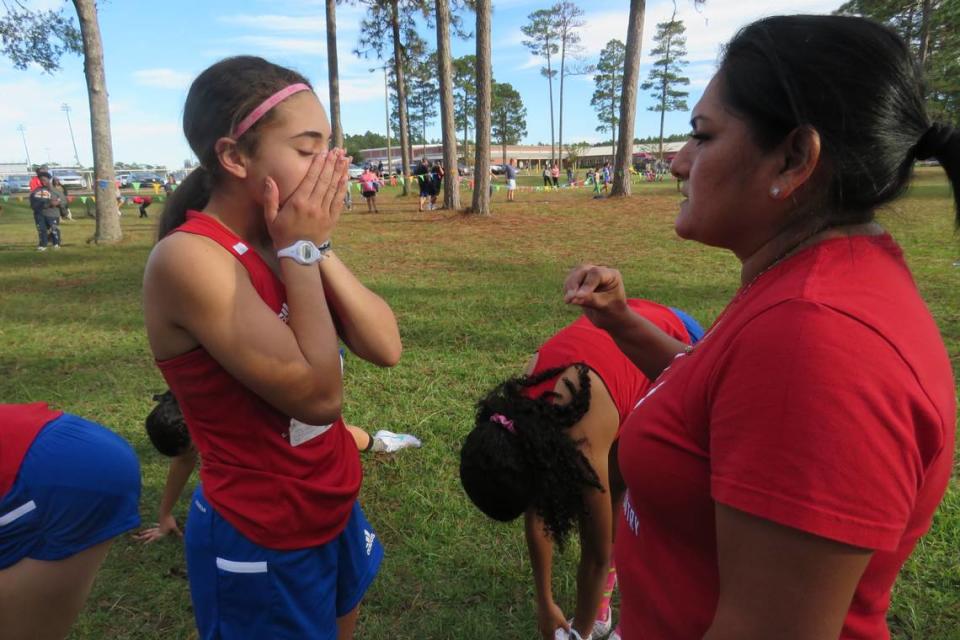
‘You’re gonna have to push each other’
At the starting line, the girls crowded together, between Pass Christian and Biloxi.
They circled up for a prayer with their coach, and then waited for the starting gun.
“At some point, you’re gonna have to push each other,” Montoya told them. “Just race.”

When it came, dozens of runners shot off across the field before funneling onto the narrower path.
Near the first mile marker, Leandra was in the top 10, with a crowd of runners from Ocean Springs. Montoya and Reddecliff, who station themselves along the course during races, were feeling optimistic.
Then, waiting for the runners to pass the four-kilometer mark, Montoya got a text from another teacher: Leandra was throwing up.
But two minutes later, she wore an expression of grim determination as she tore past her coaches.
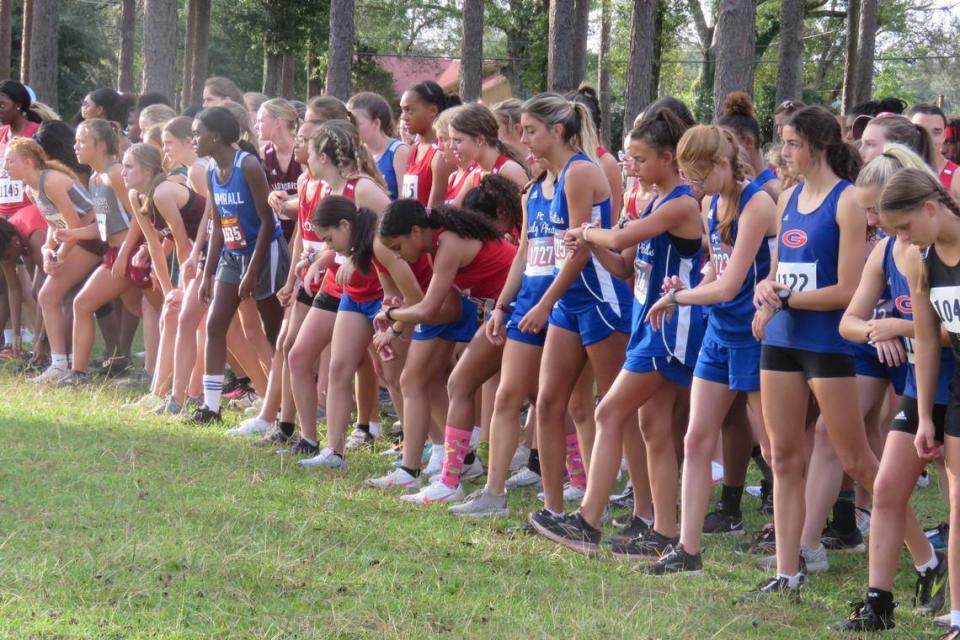
In the final sprint to the finish, she passed two runners and ended up in sixth place.
By finishing in the top 25 at the regional meet, she was guaranteed a spot at state.
Now, the question was whether the whole team would join her.
As they finished, the girls walked back to the team’s base, where their bottled water and Swedish Fish were waiting. They flopped down on the folding benches and stared into space in silence.
Naomi Rodriguez was proud: She had cut her time from 36 minutes the first time she ran the course a few months ago to 30 minutes.
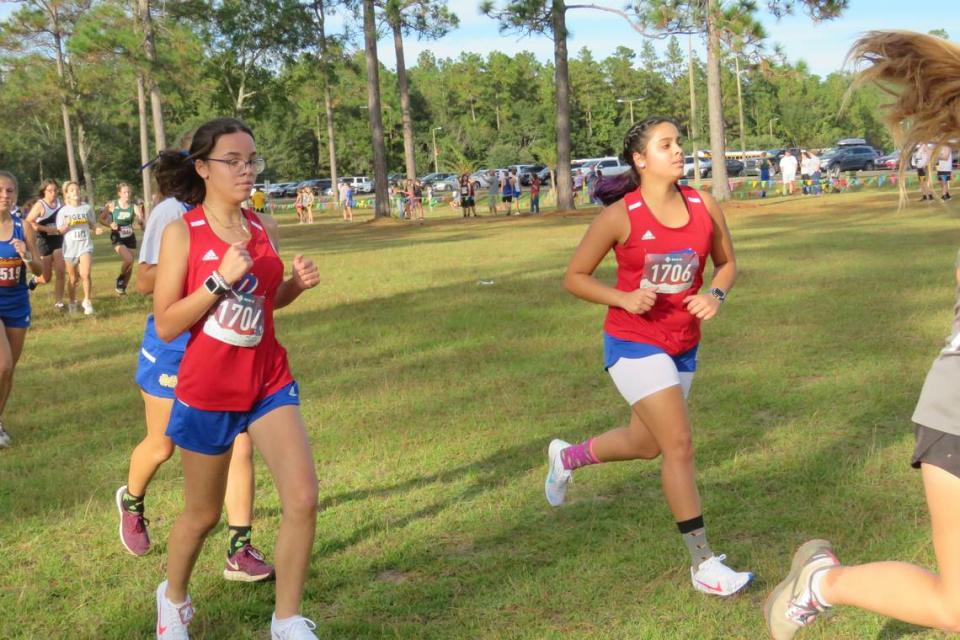
But Kenairis leaned on Carolina and cried.
Later, she explained how she had gotten a cramp, and the race started to go downhill.
“I would keep jogging, ‘cause I train myself that pain is temporary, it will get better eventually, but I started freaking out and panicking,” she said. “I was like speed walking, Black Friday type, whenever you try to get the newest microwave. I was like that, trying to cut time. And then whenever I saw my final time, that’s when I broke down, ‘cause I can do so much better. I was like, ‘I let my team down, I let my mom down.”
Leandra came to talk to her. If her teammates weren’t proud of their races, their captain was.
“I asked them, ‘Did you push yourself?’” Leandra said. “They said yes. So that’s good.”

George County to Pascagoula
After the boys raced, the runners packed up their benches and tarps and tents and trooped back onto the bus as the sun was setting.
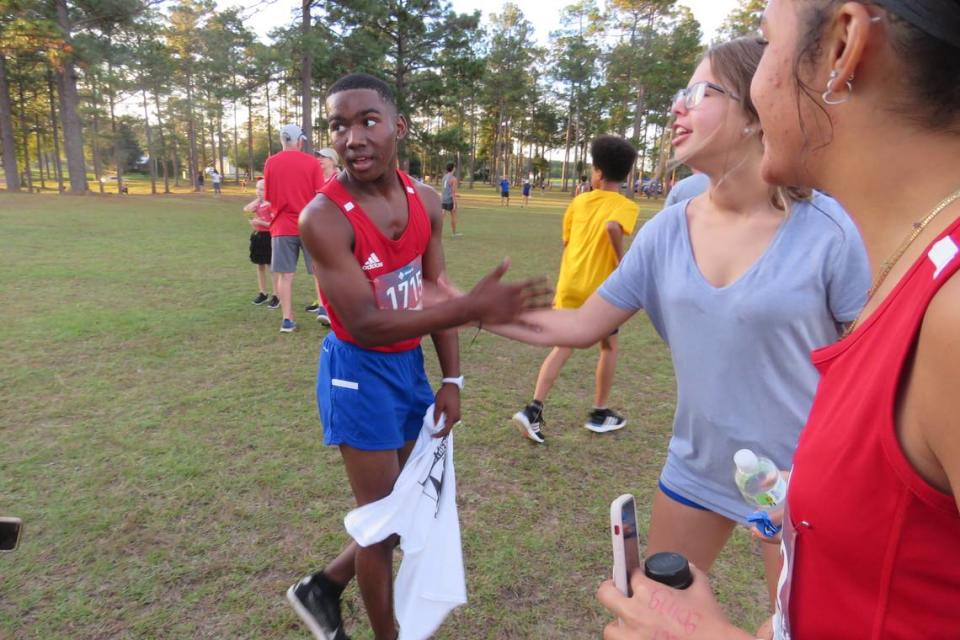
From the back of the bus, Leandra congratulated everyone and led a round of applause. Then she made an announcement on behalf of all the captains: No talking on the ride home.
“Put your headphones in, write in your journals, think about what you did, what you could have done better, and yeah, complete silence,” she said.
The runners didn’t know that in a few days, they would get the news that the boys and girls teams had both qualified for state. Then would come the indoor track season, and then outdoor track. Then the school year would end, and another summer of base training will bring miles and miles of hot and humid runs from Pascagoula High School to the beach and back.
On the bus that night, after a few shouts of protest, Leandra’s orders were respected. The runners were silent. They looked at their phones or out the window, passing cotton fields and Confederate battle flags, piney woods and gas stations as the bus rolled down Highway 63, home to Pascagoula.


 Yahoo Movies
Yahoo Movies 
